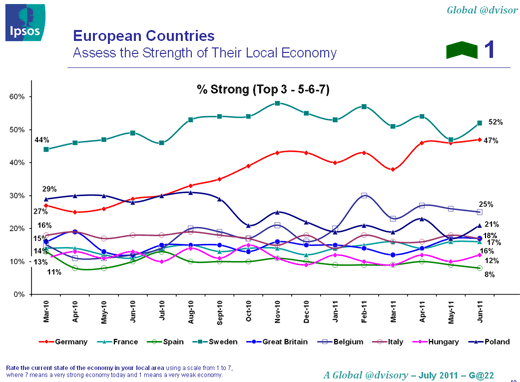Britons still among the most negative in the world on economy
New research by Ipsos shows that around one in eight (13%) Britons rate their economy as “good”.
The latest Ipsos Global @dvisor survey conducted in 24 countries shows only the French (12%), Italians (10%), Japanese (8%), Hungarians (6%), and Spanish (6%) are more downbeat in assessing their economy than Britons.
While Britons are pessimistic about the state of the economy this is not the case everywhere. Three quarters of Swedes (76%) describe the current economic situation in their country as good, as do around seven in ten Canadians (69%) and Germans (68%).
In Europe, there is a stark difference between confidence in countries at the top such as Germany and Sweden and those where confidence remains stubbornly low, such as Britain, as the chart below shows.

A spokesperson for Ipsos, said:
“In the wake of the debt crisis, it’s no surprise that the British public remain among the most negative worldwide, along with a group of major European countries including Spain, Italy and France. Coupled with the cost of living increasing rapidly in comparison to earnings, it’s not a shock that confidence isn’t improving. This is a major concern, though, as we know how important consumer sentiment is to economic recovery.
Technical note
Ipsos Global @dvisor is a monthly online survey conducted by Ipsos via the Ipsos Online Panel system in 24 countries around the world. The countries reporting herein are Argentina, Australia, Belgium, Brazil, Canada, China, France, Great Britain, Germany, Hungary, India, Indonesia, Italy, Japan, Mexico, Poland, Russia, Saudi Arabia, South Africa, South Korea, Spain, Sweden, Turkey and the United States of America.
For the results of the survey presented herein, an international sample of 18,607 adults age 18-64 in the US and Canada, and age 16-64 in all other countries, were interviewed. Approximately 1000+ individuals participated on a country by country basis via the Ipsos Online Panel with the exception of Argentina, Belgium, Indonesia, Mexico, Poland, Saudi Arabia, South Africa, South Korea, Sweden and Turkey, where each have a sample approximately 500+.
Weighting was employed to balance demographics and ensure the sample's composition reflects that of the adult population according to the most recent country Census data available and to provide results intended to approximate the sample universe, (in the small number of developing countries where access to the internet is limited respondents are more likely to be affluent and well connected than the average member of the population.



